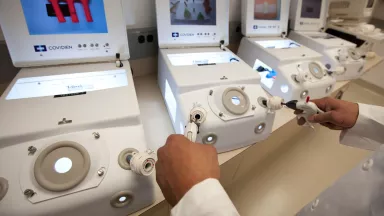Introduction
Our world-renowned orthopedic surgeons and orthopedists are experts in their fields with specialized training to provide the optimal diagnosis and treatment for a range of orthopedic conditions. We are internationally recognized for delivering the highest-quality orthopedic care to our patients.
What is rheumatoid arthritis?
Rheumatoid arthritis (RA) is a condition in which the body’s own immune system attacks the joints. This causes swollen, stiff and painful (inflamed) joints, especially in the hands and feet.
Over time, RA can damage and deform joints. It makes it hard to open jars, write and do other daily tasks. Sometimes it can also cause bumps to form under the skin. RA is more common in women than in men. It often starts between the ages of 40 and 60.
What causes it?
The cause of RA isn’t fully understood, but it’s an autoimmune disease. This means that the body’s natural defense system attacks the joints. Genes play a role, but experts don’t know exactly what that role is.
What are the symptoms?
Symptoms of RA often develop slowly over weeks or months. Fatigue and stiffness are usually early symptoms. The disease usually affects both sides of the body at the same time. Joint symptoms include:
- Pain, stiffness and swelling in the joints of the hands, wrists, elbows, feet, ankles, knees, or neck
- Morning joint stiffness or stiffness that may develop after long periods of sleeping or sitting, usually lasting for at least one hour and often up to several hours
- Rheumatoid bumps (nodules), which occur in nearly one-third of people with RA; usually form over pressure points in the body such as the elbows, knuckles, spine and lower leg bones, and range in size from a pea to a mothball.
Rheumatoid arthritis can also cause symptoms throughout the body (systemic). These include:
- Fatigue
- Loss of appetite
- Weight loss
- Mild fever
How is it diagnosed?
RA is most often treated with medicine. Some medicines help to control the symptoms. Other medicines, especially when used early, can help to prevent the disease from getting worse.
Many of the medicines used to treat RA have side effects, which is why it’s important to have regular checkups and talk with your doctor about any problems. This will help your doctor find a treatment that works for you.
Physical therapy and finding the best balance between rest and activity can also help alleviate your symptoms.
If your treatment doesn’t help, surgery may be an option. The type of surgery you can have depends on which joints are causing problems. Sometimes surgery to replace a joint, such as a hip or knee, is an option. Other types of surgery can remove debris or inflamed tissue from a joint, or relieve pressure on nerves.
Physician Referrals
Montefiore Einstein embraces a collaborative approach.
If you have a patient who could benefit from our services, please reach out.
718-920-2060
Schedule a Visit
Have a general question or concern?
We’re available to help you by phone or email.
• 718-920-2060 • orthofeedback@montefiore.org






